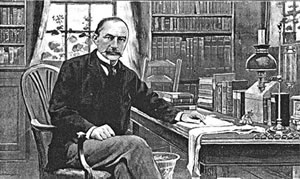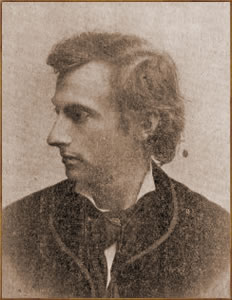De Duitse schrijver en liteatuurcriticus Marcel Reich-Ranicki werd geboren op 2 juni 1920 in Włocławek, Polen. Reich-Ranicki viert vandaag zijn 90e verjaardag. Zie ook mijn blog van 2 juni 2009.
Uit: Für alle Fragen offen
„Was halten Sie von Gustave Flaubert und Madame Bovary?
Gustave Flaubert war beides – ein Poet und ein Protokollant, ein Romantiker und ein Realist, ein Visionär und ein Berichterstatter, stets leidenschaftlich und pedantisch zugleich. Er war Frankreichs sachlichster Dichter und zärtlichster Chronist, wahrscheinlich der neben den Russen Tolstoi und Dostojewski größte Prosaschriftsteller des neunzehnten Jahrhunderts. Sein Hauptwerk, der Roman Madame Bovary, hat längst die Grenzen gesprengt: Er wurde in alle Sprachen der zivilisierten Welt übersetzt, man hat ihn mehrfach verfilmt und auch vertont und für die Bühne bearbeitet. Und natürlich wurde er zahllose Male kommentiert.
Woran geht eigentlich Emma Bovary, deren Geschichte Flaubert erzählt, zugrunde? An der unglücklichen Ehe mit einem biederen und langweiligen Landarzt? An ihrer bornierten, kleinbürgerlichen Umgebung? An der Monotonie des Alltags in einem französischen Provinznest? An dem Konflikt zwischen Traum und Leben, zwischen Phantasie und Realität, also an der Scheinwelt, in der sie Zuflucht sucht? Sind es die überspannten Wünsche und die romantischen Vorstellungen, die ihr zum Verhängnis werden? Oder scheitert sie an der Liebe, genauer: an der Sehnsucht nach Liebe?
So viele Fragen es auch sind, die der Roman aufwirft – die Zahl der Antworten ist ungleich größer. Denn jeder Leser versteht diese Geschichte auf seine Weise. Millionen haben sich in ihr wieder gefunden – vielleicht deshalb, weil wir hier von einem Menschen hören, dem kein Preis zu hoch war, um zu leben, statt zu vegetieren. Es gibt nicht viele Romane, von denen man sagen kann: Wer sie nicht gelesen hat, sollte wissen, dass er keine Ahnung hat, was die Weltliteratur leisten kann. Madame Bovary ist ein solcher Roman.“

De Amerikaanse schrijver Jim Knipfel werd geboren op 2 juni 1965 in Green Bay, Wisconsin. Zie ook mijn blog van 2 juni 2007 en ook mijn blog van 2 juni 2008 en ook mijn blog van 2 juni 2009.
Uit: Slackjaw: A Memoir
“”Suicide hotline?” the chipper young woman on the other end of the phone seemed to ask me when she answered.
When I dialed the phone, I had no idea what I was going to say. I hadn’t thought that far ahead. What: “I’m about to open my veins. Now what the hell are you going to do about it?” That wouldn’t do. I get into trouble when I don’t think about things beforehand. I’ve never been a good improviser. So instead of saying something moronic, I opted to say nothing at all.
“Hello?” the voice at the other end returned. “Anyone there?”
All the Nietzsche I had been immersed in went right out the window.
“Hello?” she asked again. “I can hear you breeaathing!”
“Shut up,” I snapped. I was tempted to say, “That’s it, you blew it,” and hang up, but I wasn’t that cruel, yet.
“So what’s going on?”
Oh, what do you think? That I just called to chat?
“I meant, what are you planning?” She meant business.
“Razors. I guess. At least that’s what I have in front of me.”
“Razors rarely work, you know.”
Terrific. I call for help, and I get someone who critiques my style.
“Got any better suggestions? I can’t afford a gun.”
“That’s not what I’m here for. I’m here to help.”
“Well, you’re doing a bang-up job of it.”
“Hey,” she said, “we got off on the wrong foot.” I could hear the exasperation in her voice. “Let’s start again. What’s your name?”
“Name doesn’t matter.”
“Okay,” she said. “Why don’t you tell me why you want to kill yourself?”
“A man has to have a reason? I didn’t break up with a girlfriend, I didn’t lose a job, and I wasn’t just told that I have Hodgkin’s disease. Nothing that simple.”
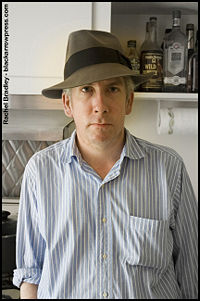
De Duitse schrijfster Sibylle Berg werd geboren in Weimar op 2 juni 1962. Zie ook mijn blog van 2 juni 2007 en ook mijn blog van 2 juni 2008 en ook mijn blog van 2 juni 2009.
Uit: Der Mann schläft
“Damals.
Im Winter. Vor vier Monaten.
Draußen war ein Winter gewesen, der den Bildern, die wir früher vom Winter gehabt haben, nicht einmal entfernt glich. Saubere, tiefgekühlte Dezember mit Reif und kleinen Häusern, in denen gepflegte Familien vor Bratäpfeln saßen, gab es schon lange nicht mehr. Kein Schnee verdeckte die Unattraktivität der Welt, nur dunkelgrau war sie, klamm und verwaschen. Während drei langer Monate würde das Licht sich kaum verändern; dem Winter würde ein verregneter Frühling folgen, der in einen trüben Sommer überging.
Nebel lag auf der Stadt, die noch nicht einmal eine Stadt war, und der Mensch hielt Winterschlaf. Die es sich leisten konnten, verließen ihre Häuser nicht, sie schlurften in Pyjamas herum, Speisereste im Haar, leere Pizzaschachteln unter dem Bett, und Spinnen mit neurotischen Gesichtern spannen ihre Netze zwischen den Läufen der Personen. Die wenigen, die man auf öffentlichem Gelände sah, waren kaum dazu geeignet, einen mit kleinen, fröhlichen Sprüngen das Leben feiern zu lassen.
Ich war auf der Straße gewesen, hatte in hoffnungslose Gesichter gesehen und mich einen Moment lang gefühlt, als sei ich wieder eine von ihnen, die doch so warteten, dass etwas eintreten werde, durch das sie sich endlich wieder lebendig fühlten. Ich hatte mich an jenem Morgen so stark an das Gefühl erinnert, bei aberwitzigem Wetter alleine zu sein, dass mir übel geworden war, für Sekunden, in denen ich aus der Wirklichkeit gefallen war. Ich hatte eine Zeitung kaufen wollen, und als ich, die Augen vor dem Elend halbverschlossen, das einzige im Winter geöffnete Café passierte, vermeinte ich darin Gespenster aus der Vergangenheit wahrzunehmen. Eine füllige Frau mit Armprothese saß neben einem Mann, an den ich mich nur erinnerte, weil er so übertrieben unscheinbar wirkte wie eine Karikatur.“
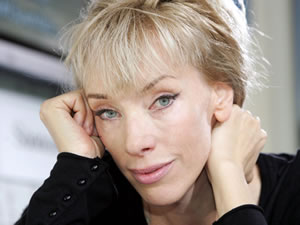
De Canadese schrijfster Carol Shields werd op 2 juni 1935 in Oak Park, Chicago, geboren als Carol Warner. Zie ook mijn blog van 2 juni 2009.
Uit: Small Ceremonies
„September
Sunday night. And the thought strikes me that I ought to be happier than I am.
We have high tea on Sunday, very Englishy, the four of us gathered in the dining ell of our cream-coloured living room at half-past five for cold pressed ham, a platter of tomatoes and sliced radishes. Slivers of hardboiled egg. A plate of pickles.
The salad vegetables vary with the season. In the summer they”re larger and more varied, cut into thick peasant slices and drenched with vinegar and oil. And in the winter, in the pale Ontario winter, they are thin, watery, and tasteless, though their exotic pallor gives them a patrician presence. Now, since it is September, we are eating tomatoes from our own suburban garden, brilliant red under a scatter of parsley. Delicious, we all agree.
“Don”t we have any mustard?” my husband Martin asks. He is an affectionate a
nd forgetful man, and on weekends made awkward by leisure.
“We”re all out,” I tell him, “but there”s chutney. And a little of that green relish.”
“Never mind, Judith. It doesn”t matter.”
“I”ll get the chutney for you,” Meredith offers.
“No, really. It doesn”t matter.”
“Well, I”d like some,” Richard says.
“In that case you can just go and get it yourself,” Meredith tells him. She is sixteen; he is twelve. The bitterness between them is variable but always present.
Meredith makes a sweep for the basket in the middle of the table. “Oh,” she says happily, “fresh rolls.”
“I like garlic bread better,” Richard says. He is sour with love and cannot, will not, be civil.“
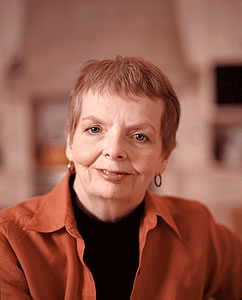
De Spaanse schrijver Max Aub werd geboren op 2 juni 1903 in Parijs. Zie ook mijn blog van 2 juni 2007 en ook mijn blog van 2 juni 2008 en ook mijn blog van 2 juni 2009.
Uit: Crimes exemplaires (Vertaald door Jean Paul Guibbert)
„Il ronflait. On pardonne au ronfleur s’il est de votre famille.
Celui-là je ne le connaissais même pas de vue. Ses ronflements traversaient les murs. Je suis allé chez le propriétaire : il s’est moqué de moi. Je suis allé voir l’auteur de bruits si monstrueux ; il m’a pratiquement mis à la porte :
– Ça n’est pas ma faute. Je ne ronfle pas. Et si c’est moi, que voulez-vous que j’y fasse ? J’ai le droit. Achetez-vous du coton hydrophile…
Je ne pouvais pas dormir : s’il ronflait, à cause du bruit ; et en l’attendant, s’il ne ronflait pas. Quand je donnais des coups sur la cloison il se taisait un moment… mais recommençait ensuite. Vous n’avez pas idée de ce que c’est que d’être une sentinelle du bruit. Une cataracte, un formidable volume d’air,
un fauve pris au piège, le râle de cent moribonds, me déchiraient les entrailles, empoisonnaient mes oreilles et je ne pouvais jamais dormir, jamais. Et je ne pouvais même pas changer de maison. Où aurais-je été, où payer aussi peu ? Le coup qu’il a pris, c’est avec la carabine de mon neveu.
Je ne puis supporter le contact du velours. J’ai une allergie au velours. En ce moment même ma peau se hérisse au seul fait d’en parler. J’ignore comment tout ceci est arrivé dans la conversation. Cet homme, si raffiné, ne croyait à rien d’autre qu’à la satisfaction de ses fantaisies. J’ignore d’où il a sorti un morceau de ce maudit velours qu’il a commencé à me promener sur les joues, sur la nuque et les narines ; mais c’es
t bien la dernière fois qu’il l’a fait.
J’avais raison ! Ma théorie était irréfutable. Et ce vieux gâteux niait tout avec son sourire imperturbable comme s’il était Cassandre et investi par charisme de sa divine infaillibilité. Mes arguments étaient absolument parfaits, indiscutables. Et cet imbécile décrépit à la barbe sale, édenté, couvert de tous ses doctorats honoris causa, les mettait en doute et s’obstinait dans des théories démodées qui n’étaient vivantes que dans son esprit ankylosé et ses livres que personne ne lit plus. Vieillard putréfié.“
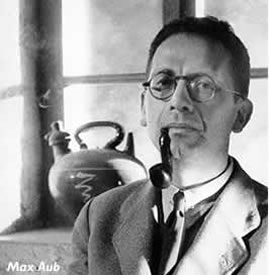
Zie voor nog meer schrijvers van de 2e juni ook mijn vorige blog van vandaag.

